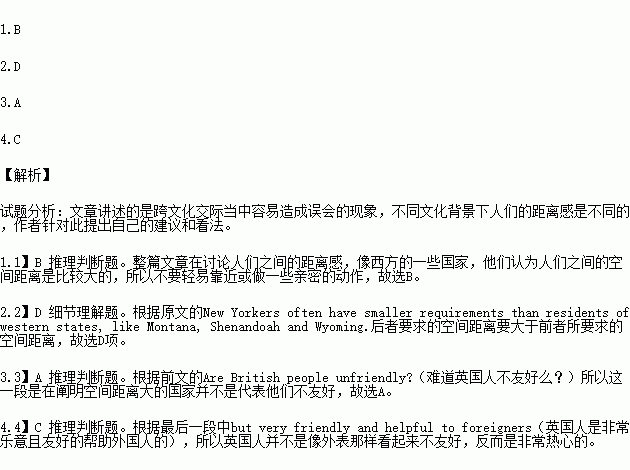题目内容
It could happen just about any time you step out in public. You get onto an almost-empty bus, but the next passenger in decides to ignore dozens of empty seats to sit right next to you. While you're waiting in line at a supermarket, the next customer insists on standing only two inches behind you and shouting into his cell-phone. You go into a public restroom, and the next person to enter decides to use the next stall. Transgressions(冒犯) like these don't just make us feel uncomfortable; we often feel anxious, alarmed; and violated(被侵犯的). It is the attack of the personal-space invaders.
In any society, shared definitions of personal space govern how we interact with other people. People living in densely(密集地) populated cities like Mumbai, Beijing, or Mexico City tend to require less personal space than people living in sparsely(稀少地) populated places within the country. In America, New Yorkers often have smaller requirements than residents of western states, like Montana, Shenandoah and Wyoming. Because everyone has different standards, gestures that are innocent in one place can be interpreted as opposite in another, especially in Britain.
As the British etiquette(礼仪) website Debrett puts it, as a British person, somebody standing too close may make you "focus less on what somebody is saying than on how close they are to you". Simple acts like putting an arm around someone you don't know may seem friendly in China, but they can make us very uncomfortable. People from many European countries such as France and Spain kiss each other on the cheek when they meet, yet to British person, this seems too friendly and "touch-freely". The website explains! "The British are not backslappers(拍人后背的人) and generally do not show affection in public".
Are British people unfriendly? Far from it. The website adds that they are not as "stand-offish and aloof' as they may seem, but very friendly and helpful to foreigners. However, remember not to be too close. If you are going to come closer than an arm's length, please let them know.
1.According to the passage, if you were meeting a British for the first time, it would be polite of you to ________.
A. kiss him/her on the cheek
B. keep an arm's length away from him/her
C. put an arm around him/her
D. slap his/her back
2.According to the passage, who tend to require more personal space?
A. People living in Beijing and people living in Mexico City.
B. People living in Mumbai and people living in Shenandoah.
C. People living in Wyoming and people living in New York.
D. People living in Wyoming and people living in Montana.
3.The underlined word "stand-offish and aloof' in the last paragraph is closest in meaning to ________.
A. cold and indifferent
B. modest and cool
C. gentlemanly and kind-hearted
D. independent and strong-willed
4.What can we conclude from the article?
A. British people like to sit next to other people on empty buses.
B. British people usually kiss strangers on the cheek to greet them.
C. British people are helpful though they may not appear to be.
D. British people are delighted to show affection in public.
 阅读快车系列答案
阅读快车系列答案
